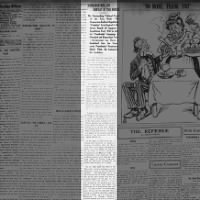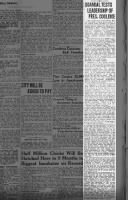Powered by Ancestry AI This feature is powered by an AI language model using public information. Quality and accuracy may vary. The views and opinions expressed do not necessarily reflect those of Newspapers.com™ or Ancestry®.

News from February 24, 1924 (Buffalo Courier, via Newspapers.com™)
President Coolidge Navigates Changing Political Landscape
On February 24, 1924, newspapers reported that the political landscape in the United States was abuzz with activity as the country edged closer to the presidential election. A pivotal moment occurred when President Calvin Coolidge approved the selection of Attorney General Harry M. Daugherty as a delegate-at-large from Ohio to the Republican national convention. This move was perceived as a strong indication of the President’s support for Daugherty, despite internal party criticisms and demands for his resignation.
The influence of Daugherty was set to be significant, given that the convention was to be held in his home state, Ohio. Under Ohio laws, no delegate-at-large could be selected without the president’s approval, and Daugherty’s role in the selection of the Ohio delegation could potentially shape the convention’s direction.
The political discourse of the time was heavily influenced by the Teapot Dome scandal, which highlighted the need for government morality in both domestic and foreign matters. Commentator David Lawrence, a respected political writer, underscored the public’s desire for a new party or reassurance that leaders who had betrayed their trust would be removed from power. Lawrence predicted the west would play a crucial role in the upcoming election, with voters’ dissatisfaction over crop prices and agricultural conditions potentially leading to a departure from the established political order.
A sharp divide within the Republican party was becoming increasingly apparent. The Conservative wing was aligned with business and financial sectors, while the Radical wing represented the middle-class elements of the Republican base. This divide threatened party unity and raised questions about the future leadership and direction of the Republicans.
Meanwhile, the Democratic party presented unity, aiming to champion the interests of the ‘plain people’ against special privileges. This approach suggested a return to the Democratic values associated with past leaders like Jefferson, Jackson, and Cleveland.
David Lawrence continued to explore the national situation, emphasizing the importance of President Coolidge’s leadership during the unfolding scandals. The outcome of these controversies, he argued, would heavily influence Coolidge’s candidacy and the overall political climate, underlining the essential role of government morality in public perception and leadership credibility.
Learn more about February 24, 1924 through historical newspapers from our archives. Explore newspaper articles, headlines, images, and other primary sources below.
Source Articles and Clippings
 President Backs Attorney General For Delegate To G.O.P. Convention 24 Feb 1924, Sun Buffalo Courier (Buffalo, New York) Newspapers.com
President Backs Attorney General For Delegate To G.O.P. Convention 24 Feb 1924, Sun Buffalo Courier (Buffalo, New York) Newspapers.com
 Fall Campaign To Be Decided In The West 24 Feb 1924, Sun Buffalo Courier Express (Buffalo, New York) Newspapers.com
Fall Campaign To Be Decided In The West 24 Feb 1924, Sun Buffalo Courier Express (Buffalo, New York) Newspapers.com
 Coolidge-Mellon Defeat In The House 24 Feb 1924, Sun The Brooklyn Citizen (Brooklyn, New York) Newspapers.com
Coolidge-Mellon Defeat In The House 24 Feb 1924, Sun The Brooklyn Citizen (Brooklyn, New York) Newspapers.com
 Scandal Tests Leadership Of Pres. Coolidge 24 Feb 1924, Sun The Buffalo Times (Buffalo, New York) Newspapers.com
Scandal Tests Leadership Of Pres. Coolidge 24 Feb 1924, Sun The Buffalo Times (Buffalo, New York) Newspapers.com